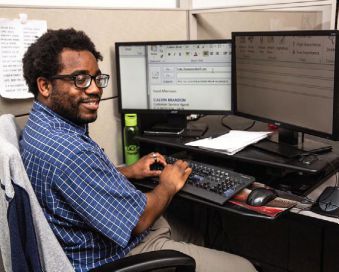WHAT'S HAPPENING
ARTIFICIAL INTELLIGENCE IS MAKING A BIG DIFFERENCE FOR PEOPLE WHO ARE BLIND
New free technology tools are helping change lives.
National Industries for the Blind, the nation's largest employer of people who are blind, recognizes and celebrates the significant impact technology advances are having on everyday life for people who are blind. Advances in artificial intelligence are making an especially strong impact and allowing for greater access and inclusion.

A GLIMPSE OF THE FUTURE: Advances in AI are making a strong impact and allowing for greater access and inclusion in the workplace.
Recently, Google rolled out new accessibility tools (https://blog.google/outreach-initiatives/accessibility/making-daily-tasks-accessible) designed to better assist people who are blind. Tools like Lens in Maps rely on artificial intelligence and augmented reality to allow users to orient themselves in unfamiliar surroundings and discover new places around them. Other accessibility features include auditory feedback and enhanced screen reader capabilities. The new version of Guided Frame uses a combination of audio cues, high-contrast animations, and haptic feedback to make it easier for people who are blind to take better photos and selfies. Google’s Pixel camera has also upgraded its camera to include a Magnified tool that can zoom in on anything, just as one would with a magnifying glass.
“Technology is rapidly growing, and many of the assistive apps have now incorporated artificial intelligence to give users who are blind or have low vision more detail,” said Doug Goist, program manager of workforce development for NSITE, NIB’s national talent management enterprise. Goist, who is blind, added, “I use these apps regularly and their capabilities just keep getting better and better. AI is a major game changer for employees who are blind or have low vision, and Google’s recent announcement shows their continuing commitment to enhancing the lives of people who are blind, both in the U.S. and worldwide.”
Google's tools are just one of the many options now available that improve accessibility through AI. For example, Microsoft's Seeing AI (microsoft.com/en-us/ai/seeing-ai) app provides a variety of free tools to narrate the world around people who are blind or have low vision. These include a currency identification component, a tool to read handwriting, and an app that allows users to recognize friends and describes the people around them in detail, including their emotional state.
NIB celebrated its 85th anniversary in 2023. It was incorporated on August 10, 1938, after President Franklin D. Roosevelt signed the historic Wagner-O'Day Act in June of that year. NIB is a central nonprofit agency for the AbilityOne Program, a small government program that provides employment opportunities for people who are blind or have significant disabilities.
Over the past eight decades, NIB has paved the way for people who are blind to build successful careers, realize dreams like higher education and home ownership, and achieve personal and economic independence.
"While our mission has remained constant, the means of achieving it have evolved," said Kevin Lynch, NIB president and chief executive officer. "In a future where opportunity is limited only by our imagination, NIB will continue to empower people who are blind to choose the preferred career path and chart their own journey to achieving the American Dream."
People who are blind have one of the highest unemployment rates – 70% of working age Americans who are blind are not employed. According to the Bureau of Labor Statistics, the jobless rate for people with a disability is about twice as high as the rate for people without a disability.
Many people who are blind and actively searching for jobs have advanced degrees and valuable professional experience, including many veterans. NIB works with potential employers and with job seekers who are blind, assisting both in finding the right fit. NIB launched NSITE in 2021, which provides award-winning training and professional development and empowers people who are blind to build successful careers.
While employers know that creating a diverse and inclusive workforce is important, they don’t always know how to accomplish that, especially when it comes to people who are blind and visually impaired. “Technology is helping many employers easily create an inclusive workplace with an eager workforce,” Goist added.
For more information on National Industries for the Blind, visit nib.org •
ABOUT NATIONAL INDUSTRIES FOR THE BLIND:
Incorporated in 1938, NIB is the nation's largest employment resource for people who are blind, and through its network of associated nonprofit agencies, is the largest employer of people who are blind in the U.S. NIB creates opportunities for people who are blind to become wage earners and taxpayers, reducing their reliance on government support and increasing engagement in their communities. The organization offers career training and assists employers and employees in developing mutually beneficial workplaces. NIB's vision is that blindness is not a barrier to employment. In 2021, NIB launched a national talent management enterprise known as NSITE. NSITE provides a continuum of employment services that connect employers with talented, dedicated people who are blind or visually impaired, including veterans. For more information, visit nib.org or nsite.org.